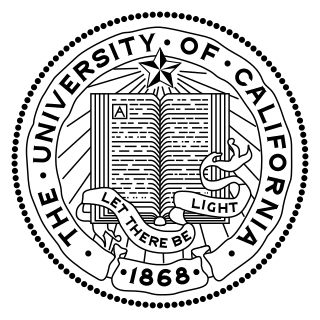
The University of California (UC) is a public land-grant research university system in the U.S. state of California. Headquartered in Oakland, the system is composed of its ten campuses at Berkeley, Davis, Irvine, Los Angeles, Merced, Riverside, San Diego, San Francisco, Santa Barbara, and Santa Cruz, along with numerous research centers and academic centers abroad. The system is the state's land-grant university.

The California State University is a public university system in California, and the largest public university system in the United States. It consists of 23 campuses and seven off-campus centers, which together enroll 457,992 students and employ 56,256 faculty and staff members. In California, it is one of the three public higher education systems, along with the University of California and the California Community Colleges systems. The CSU system is officially incorporated as The Trustees of the California State University, and is headquartered in Long Beach, California.

Clark Kerr was an American economist and academic administrator. He was the first chancellor of the University of California, Berkeley, and twelfth president of the University of California.

Jo Freeman aka Joreen, is an American feminist, political scientist, writer and attorney. As a student at the University of California, Berkeley in the 1960s, she became active in organizations working for civil liberties and the civil rights movement. She went on to do voter registration and community organization in Alabama and Mississippi and was an early organizer of the women's liberation movement. She authored several classic feminist articles as well as important papers on social movements and political parties. She has also written extensively about women, particularly on law and public policy toward women and women in mainstream politics.
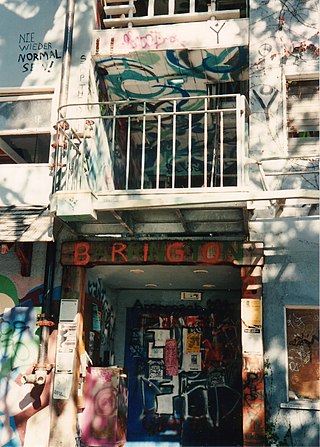
Barrington Hall was a student housing cooperative in the University Students' Cooperative Association (USCA) system in Berkeley, California, from 1935 to 1943 and 1950 to 1989. It is currently privately operated student housing.

John Jefferson Poland, who sometimes went by Jefferson Fuck Poland and Jefferson Clitlick, was an activist who co-founded the Sexual Freedom League.
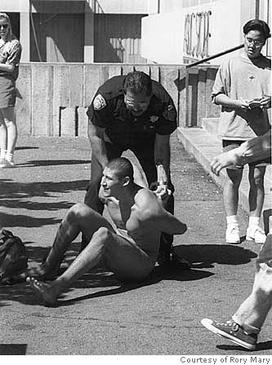
Luis Andrew Martinez was an activist who was known at the University of California, Berkeley as the Naked Guy.
A naked party, also known as nude party, is a party where the participants are required to be nude. The parties have become associated with college campuses and with college-aged people; they gained prominence after naked parties were organized at Brown University and Yale University. While the roots of naked parties come from the nudism movements and campus streaking, the modern "naked party" movement appears to have its roots at Brown University in the 1980s. Attendees of naked parties often report that they stop feeling awkward after just a few minutes since everyone has disrobed before entering the party and since everyone's nudity is accepted, regardless of body type. According to reports, most naked college parties are sex-free. At Brown University, the nakedness is "more of an experiment in social interaction than a sexual experience".
The University of California, Los Angeles (UCLA) traces back to the 19th century when the institution operated as a teachers' college. It grew in size and scope for nearly four decades on two Los Angeles campuses before California governor William D. Stephens signed a bill into law in 1919 to establish the Southern Branch of the University of California. As the university broke ground for its new Westwood campus in 1927 and dissatisfaction grew for the "Southern Branch" name, the UC Regents formally adopted the "University of California at Los Angeles" name and "U.C.L.A." abbreviation that year. The "at" was removed in 1958 and "UCLA" without periods became the preferred stylization under Chancellor Franklin D. Murphy in the 1960s. In the first century after its founding, UCLA established itself as a leading research university with global impact across arts and culture, education, health care, technology and more.
This is a list of notable events in the history of LGBT rights that took place in the 1960s.
SLATE, a pioneer organization of the New Left and precursor of the Free Speech Movement and formative counterculture era, was a campus political party at the University of California, Berkeley from 1958 to 1966.
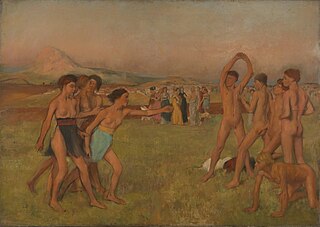
This timeline of social nudity shows the varying degrees of acceptance given to the naked human body by diverse cultures throughout history. The events listed here demonstrate how various societies have shifted between strict and lax clothing standards, how nudity has played a part in social movements and protest, and how the nude human body is accepted in the public sphere.
The 1960s Berkeley protests were a series of events at the University of California, Berkeley, and Berkeley, California. Many of these protests were a small part of the larger Free Speech Movement, which had national implications and constituted the onset of the counterculture of the 1960s. These protests were headed under the informal leadership of students Mario Savio, Jack Weinberg, Brian Turner, Bettina Aptheker, Steve Weissman, Art Goldberg, Jackie Goldberg, and others.
Leo Francis Koch was an American academic. An Assistant Professor of biology at the University of Illinois, he was fired for promoting premarital sex.

The University of California Jazz Ensembles, also known as the UC Jazz Ensembles, UC Jazz, or UCJE, is the student jazz organization founded in 1967 on the University of California, Berkeley, campus. Founded in 1967, it comprises one or more big bands, numerous jazz combos, a vocal jazz ensemble, an alumni big band, and instructional classes. With a mission statement to foster a community for the performance, study, and promotion of jazz at U.C. Berkeley, its Wednesday Night big band provides free concerts every Thursday noon on Lower Sproul Plaza, its various units perform throughout the San Francisco Bay Area including area high schools, travel to collegiate jazz festivals, and perform overseas, and for many years it sponsored the annual Pacific Coast Jazz Festival. It also provides master classes by its instructors and clinics by prominent guest artists. It has nurtured numerous musicians who have become professional jazz musicians and educators. UC Jazz Ensembles is one of three groups, with the Cal (marching) Band and UC Choral Ensembles, forming Student Musical Activities (SMA), a department within Cal Performances on the U.C. Berkeley campus. Its members are primarily U.C. Berkeley undergraduate and graduate students, representing many academic disciplines.

David W. Tucker (1929–2003) was an American jazz trombonist, music educator, composer of band and orchestral music, record producer, and marching band arranger, most renowned as the director of the University of California Jazz Ensembles from 1969 until 1985. Under his direction, the organization expanded to become the largest musical organization on the campus of the University of California, Berkeley, had an international reputation resulting from foreign tours, and sponsored the Pacific Coast Collegiate Jazz Festival. Numerous student members of the organization have become renowned jazz musicians, composers, and music educators.

The Free Speech Movement (FSM) was a massive, long-lasting student protest which took place during the 1964–65 academic year on the campus of the University of California, Berkeley. The Movement was informally under the central leadership of Berkeley graduate student Mario Savio. Other student leaders include Jack Weinberg, Tom Miller, Michael Rossman, George Barton, Brian Turner, Bettina Aptheker, Steve Weissman, Michael Teal, Art Goldberg, Jackie Goldberg and others.
The Sutter Cinema was located on Sutter Street in downtown San Francisco, just off of fashionable Union Square and a few blocks from Chinatown. It was a walk-up, on the second floor 363 Sutter, occupying the space that had previously been one of America's premiere Chinese-owned night clubs, Charlie Low's Forbidden City, which featured dancer Coby Yee.
Alliance of Libertarian Activists (ALA) was a libertarian student organization primarily located in the San Francisco Bay area, mostly active at University of California, Berkeley, established in 1965–1966, and considered the first campus group to adopt the term “libertarian.” ALA gained members from both the purged Young Americans for Freedom (YAF) Moïse Tshombe chapter and the Cal Conservatives for Political Action (CCPA) at UC Berkeley, which was a continuation of the 1964 Cal Students for Goldwater, both founded and first chaired by Dan Rosenthal.
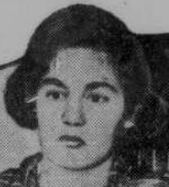
Marge Frantz was an American activist and among the first generation of academics who taught women's study courses in United States. Born in Birmingham, Alabama, from a young age she became involved in progressive causes. She worked as a labor organizer, agitated for civil rights, and participated in the women's poll tax repeal movement. After working as a union organizer for the Mine, Mill and Smelter Workers Union in 1944, she was employed full time at the Southern Conference for Human Welfare in Nashville, as a secretary and as the editor of the organization's press organ, Southern Patriot. By the late 1940s, she was being investigated by the House Un-American Activities Committee and in 1950, she and her husband moved to the San Francisco Bay Area.










